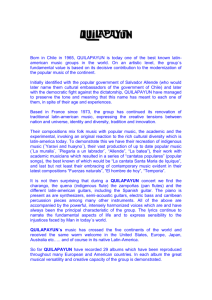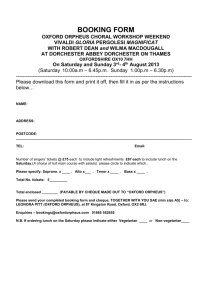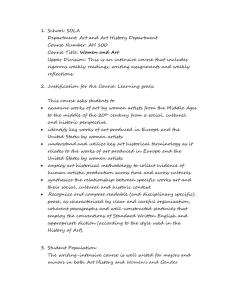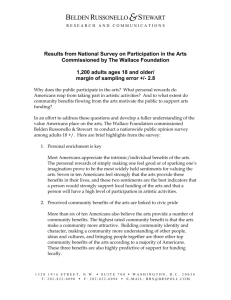As stated before, if the starting point is that a doctoral degree is a
advertisement
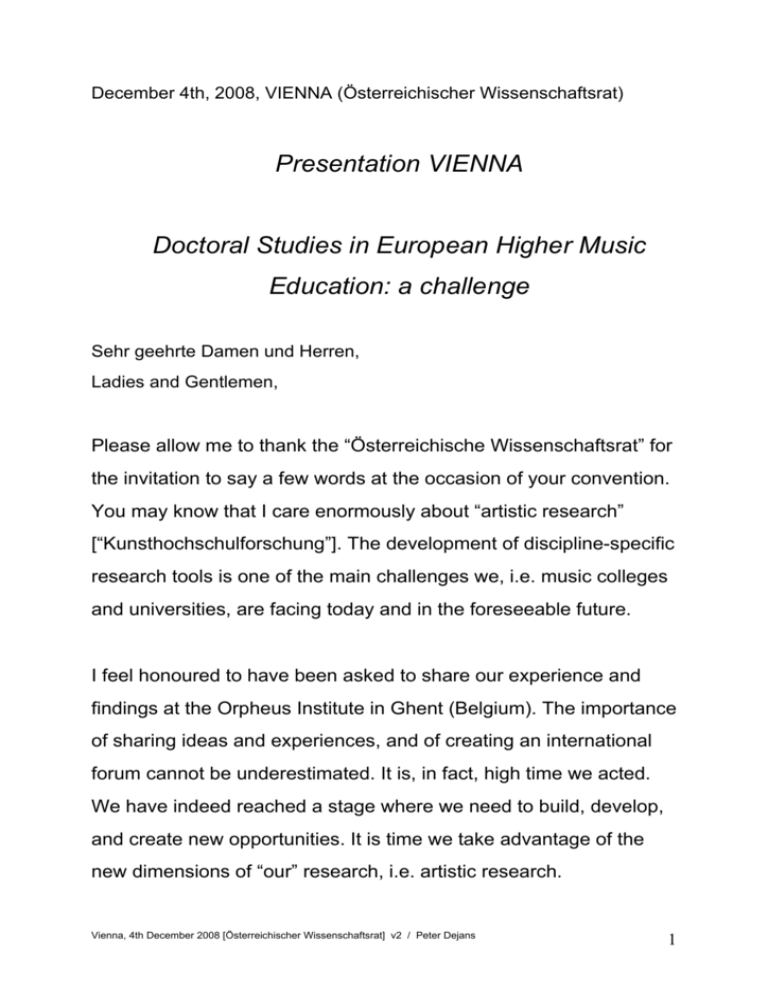
December 4th, 2008, VIENNA (Österreichischer Wissenschaftsrat) Presentation VIENNA Doctoral Studies in European Higher Music Education: a challenge Sehr geehrte Damen und Herren, Ladies and Gentlemen, Please allow me to thank the “Österreichische Wissenschaftsrat” for the invitation to say a few words at the occasion of your convention. You may know that I care enormously about “artistic research” [“Kunsthochschulforschung”]. The development of discipline-specific research tools is one of the main challenges we, i.e. music colleges and universities, are facing today and in the foreseeable future. I feel honoured to have been asked to share our experience and findings at the Orpheus Institute in Ghent (Belgium). The importance of sharing ideas and experiences, and of creating an international forum cannot be underestimated. It is, in fact, high time we acted. We have indeed reached a stage where we need to build, develop, and create new opportunities. It is time we take advantage of the new dimensions of “our” research, i.e. artistic research. Vienna, 4th December 2008 [Österreichischer Wissenschaftsrat] v2 / Peter Dejans 1 We are living in both fascinating and demanding times. And all we need to do to thrive on that is to realise the importance of seizing this historic moment. In my paper I would like to start considering some general characteristics of Third-Cycle Studies in European Higher Music Education, with reference to the outcomes of the AEC Third Cycle Working Group. In a second chapter, I will turn to a concrete example of a research environment that can serve as a case study. I’ll tell you more about the particular position of the Orpheus Institute in Ghent (Belgium) within the field of doctoral studies and about the research environment that goes with it. And I’ll end with some closing remarks. I. Third Cycle (doctorate): AEC handbook I’ll be very short about the First chapter, dealing with the actual situation of doctoral studies in European Higher Music Education. The main reason is the extensive information already given in the Handbook, which is at your disposal in hard copy and in a digital version. The European Association of Conservatories, the AEC [Association Européenne des Conservatoires, Académies de Musique et Vienna, 4th December 2008 [Österreichischer Wissenschaftsrat] v2 / Peter Dejans 2 Musikhochschulen] launched in 2004 a thematic Network for Music, called Polifonia. With the aim to participate in the discussions taking place in the higher music education sector and in the framework of the Bologna process on 3rd cycle studies, the AEC formed a 3rd Cycle Working Group, which I had the pleasure and honour to chair. The main objectives of the Third Cycle Working Group were: • To provide an overview of trends, types of courses and developments at the 3rd study cycle in music in Europe. • To develop helpful tools (f.e. learning outcomes) for music institutions wishing to establish a 3rd cycle. The main outcomes the third cycle working group reached through an intensive 3-year work plan have been written down in a Handbook or Guide to Third Cycle Studies in European Higher Music Education. The time span of this lecture does not allow me to go in detail (and I would like to mainly focus on the case study Orpheus Institute) but I’ll give you a brief overview of the information and tools presented in this Handbook: - Some broad but useful descriptions of what is to be understood by artistic research Vienna, 4th December 2008 [Österreichischer Wissenschaftsrat] v2 / Peter Dejans 3 - Institutional contexts for third cycle studies within the conservatoire environment (the role of the conservatoire) - Third Cycle Programme Development Issues and Doctoral Training Issues (organisation & conditions for doctoral training) - Potential benefits and some challenges linked to the decision to offer third cycle studies - Tools like Polifonia Dublin Descriptors and Learning Outcomes related to the doctoral degree - Information sources A free electronic version of this handbook is available through www.polifonia-tn.org There is also a German version, next to a French one. II. Case study : ORPHEUS INSTITUTE II. Case Study : Orpheus Institute Ghent * Context of the Orpheus Institute * Working definition of Artistic Research * Elements of Orpheus’ research environment - Doctoral programme for musicians - Orpheus Research Centre in Music [ORCiM] - International forum 1 Research environment : Context of the Orpheus Institute The introduction of high-quality research in an art school, adapting it to the characteristics of the discipline and thus creating a practiceVienna, 4th December 2008 [Österreichischer Wissenschaftsrat] v2 / Peter Dejans 4 based and discipline-specific research environment for artists is the real challenge we are facing here. Orpheus Institute, as an institute for advanced studies and research in music, started off in 1996 and acts as an umbrella institution for Flanders providing post-graduate education for musicians and it coordinates a doctoral programme for musicians since 2004. (no Bachelor, no Master) During its short existence, Orpheus Institute has chosen to follow a particular road by developing and promoting a new type of research that is fully embedded in musical practice and that focuses on the unique skills of musicians. It is quite obvious that musicians are, and in a sense always have been, full of questions, yet the crux of the matter lies in trying to find answers to these questions and to find ways of doing that in an involved and systematic way. 2 Working Definition : Research in and through musical practice We call this new concept ‘Artistic Research in Music’ or ‘Research in and through Musical practice’. What do we mean by that? Much of the research on music has traditionally been the preserve of academic disciplines surrounding the music art form (e.g. musicology, music history, music philosophy, music theory, music Vienna, 4th December 2008 [Österreichischer Wissenschaftsrat] v2 / Peter Dejans 5 sociology, music psychology, acoustics, etc.). This specific way of theorizing and generating knowledge has generally excluded artists from the process of formal theorizing and knowledge-building. This has led to the development of theoretical and historical constructs which, while shedding light on many complex and important historical and theoretical issues, say nothing about significant aspects of musical and artistic reality and ignore issues particularly relevant to artists. Artist-researchers have argued that knowledge generated mainly by these traditional academic disciplines represents a skewed perception of artistic reality. It could be seen as only partial knowledge and therefore not unambiguously applicable in artistic practice. The best way to correct this situation is to take artists’ daily experiences, their artistic understanding and their informal theorizing into account and, as a consequence, acknowledge the artist as artist-researcher to building theory, knowledge and artistic understanding as a means for artistic development. The following ‘definition’ of, or approach towards artistic research is used as a general guideline throughout the various activities of the Orpheus Institute. Research in and through musical practice(*) is where the researcher’s own practice and critical involvement are integral to the research subject, processes and outcomes. Vienna, 4th December 2008 [Österreichischer Wissenschaftsrat] v2 / Peter Dejans 6 [(*) Musical practice, for example: singing, playing, composing, improvising, directing, hybrid forms, and interdisciplinary work.] In doctoral research of this kind, a high level of musical creativity, imagination and skills (in a word, artistry) must therefore be demonstrated, so that research makes a substantial and original contribution to knowledge, understanding and musical practice. As you see, in this definition the basic criterion for research as an original contribution to knowledge is honoured and situated within musical practice. All research follows a sequential pattern consisting of formulating a research question, investigating it, and reporting the findings. Artistic Research must adhere to the same international standards of intellectual rigour, conceptual clarity and methodological adequacy as any other type of research. The main difference between Artistic Research and other types of research is the fact that the artist—in our case the musical artist—is involved in a significant way. The artists themselves are the researchers. Here are some distinctive features of artistic research Vienna, 4th December 2008 [Österreichischer Wissenschaftsrat] v2 / Peter Dejans 7 - We validate the unique and de facto practice-oriented view of the researchers, the unique view of somebody who is doing it. This brings us to another related particularity that has to be carefully examined, namely : - the Artist Researcher can study him- or herself as the object of research: in other words, the blending of the subject (the researcher/musician) and object of investigation - the use of aesthetic judgements in addition to critical ones, and the use of subjective aesthetic experiences - the introduction of artistic experiments as part of the research process (this excludes all those who are not artists) - the fact that the results of the research project will also rely on demonstrable components next to verbal ones, 3 Elements of the research environment There are two important aspects of Orpheus Institute’s research environment: One aspect is the specific kind of research we develop, namely ‘research in and through musical practice’, and the other is the various educational settings in which this research is promoted. These three interactive domains: Education, Research and Forum activities are, in fact, the cornerstones of Orpheus Institute’s setting. Vienna, 4th December 2008 [Österreichischer Wissenschaftsrat] v2 / Peter Dejans 8 3.1 Education 3.1.1 introduction Starting with the educational component we can say that Orpheus Institute provides three types of educational modules. There is the Doctoral Programme in Musical Arts (docARTES), a Laureate Programme and, at the basis, also a selection of specialised and field-related events such as seminars, workshops, lectures … that address the music scene as a whole. In the context of this speech, the doctoral programme is of particular interest. 3.1.2 docARTES The doctoral programme (called docARTES) is designed for highly accomplished and reflective practising musicians (performance, composition and music pedagogy) with original, clear and articulated ideas for practice-based research. It is a cooperation between the conservatories of Amsterdam and The Hague, The universities of Leiden and Leuven, the Lemmens Institute, with the Orpheus Institute in charge of the implementation and coordination of this curriculum. When the cooperation took shape in 2004, the founding partners were convinced that in order to create a high quality research environment for musicians with its proper discourse, methods and assessment criteria it was necessary to join forces, to share expertise and to build a community that represents a critical mass of artist researchers Vienna, 4th December 2008 [Österreichischer Wissenschaftsrat] v2 / Peter Dejans 9 Our doctoral students meet on a monthly basis during the first two years of their doctoral trajectory and continue their research thereafter on an individual basis. There are ten gatherings a year, mostly on two or three consecutive days. These days are centred around a specific but also generic aspect of musical practice, such as the act of listening, the act of interpreting, articulating, analysing, rehearsing, collecting, etc, and approached from different perspectives, such as a philosophical perspective, a theoretical perspective—but most importantly from an artistic and practical perspective. Students present their own research, read texts, prepare discussions. Specialists and guest speakers with examples of good practice are invited to give a presentation… all this with one goal: to create a community and a discourse for artist-researchers. 3.1.3 documa In its aspiration to continuously develop and enrich the doctoral programme, Orpheus Institute is currently involved in a groundbreaking European project as coordinating Institute: DoCuMa - Doctoral Curriculum in Musical Arts. Vienna, 4th December 2008 [Österreichischer Wissenschaftsrat] v2 / Peter Dejans 10 DoCuMa is a project funded by the European Union and involves eight higher-education institutions in three European countries (4 conservatories and 4 universities). Orpheus Institute (Belgium), coordinator Royal Conservatory The Hague (the Netherlands) Conservatory Amsterdam (the Netherlands) University Leiden (the Netherlands) Royal College of Music, London (UK) Royal Holloway, University of London (UK) University of Oxford (UK) University of Leuven (Belgium) Comprising some of Europe’s most respected professors, tutors and teachers, the documa team has pooled its diverse expertise, energies as well as educational and research experience to develop a cutting-edge practice-based doctoral curriculum for musicians – the first of its kind in Europe, Thanks to these institutional collaborations within the framework of documa and as a member of this documa-alliance, the docARTES programme has been running as an international English-spoken programme since September 2008. It is the first joint European doctoral curriculum in musical arts! For docARTES students, the membership of this internationalalliance means that Vienna, 4th December 2008 [Österreichischer Wissenschaftsrat] v2 / Peter Dejans 11 - four of our ten gatherings a year are joint sessions with the Royal College of Music, organized either in Ghent or in London. - They are part of an exciting programme of international seminars, workshops, colloquia and other events - They have unprecedented access to a wide range of research and performing resources - They are involved in a unique international network and forum of leading performers, composers and scholars - They have access to a Europe-wide team of supervisors covering a diverse range of musical specialisms In other words: an innovative and dynamic environment for practicebased research 3.2 Research We learn from our doctoral students that the field of artistic research is very broad and open and that, in order to create a solid foundation for this research discipline, more is needed than individual highly specialised projects that at first glance don’t have much in common. (They all carry in their backpack the individual research questions, but there is no construction or assembling of a general, common sediment or deposit, like a humus layer, which than could nourish the slowly developing new research discipline.) Vienna, 4th December 2008 [Österreichischer Wissenschaftsrat] v2 / Peter Dejans 12 The researcher may work in isolation, in the absence of a network of other researchers, conferences, publications, etc. and there may not be a substantial body of previous research to refer to and to lean on. Having experienced these difficulties through the past ten years and in an effort to give wings to the discipline, Orpheus Institute launched in the spring of 2007 the Orpheus Research Centre in Music [ORCiM]. The Orpheus Research Centre focuses on practice-based research in music and addresses discipline-specific questions. It explicitly lays the foundations for an artistic research discipline in music, thereby developing the tools necessary for artistic research of the highest standard and generating new research in the field. We ultimately aim at creating a research community and a common ground for this kind of research. We believe, ORCiM plays a unique role in the world of research and higher music education and establishes an international research environment that facilitates innovation and creativity in music as well as the extension of knowledge and artistic understanding. Last April, our research centre sent out a call for fellowship applications from all over the world. We were looking for rare birds: artists with a passion and a gift for searching questions. We really didn’t know what to expect, but the reaction was overwhelming. We received more than sixty applications from around the world. From Vienna, 4th December 2008 [Österreichischer Wissenschaftsrat] v2 / Peter Dejans 13 many reactions we learned that the start of this Research Centre filled a real gap. Apparently there is demand. After an intensive selection process, we admitted fourteen artistresearchers (of eleven nationalities) to ORCiM, all of them (in the first place) bright artists (performers and composers) and at the same time experienced researchers. How do we intend to proceed then the coming years as far as content is concerned? Our overall aim is clearly to develop the discipline of ‘research in and through musical practice’. The point of departure in ORCiM is the expertise that is embedded in musical practice itself. We are thus starting from what musicians know best — their own practice and the activities that go along with this practice. By these activities we mean for instance: listening, experimenting, creating, collecting, analysing, judging, articulating, interpreting …. All actions that are part of the reality of being a musician. As a long term objective we aim at collecting these elements of musical practice, we look for knowledge that is already present within the guild of musicians and we also further develop these concepts through practice-based research and collaboration with other research-disciplines. The ORCiM is currently developing research in the following areas: Vienna, 4th December 2008 [Österreichischer Wissenschaftsrat] v2 / Peter Dejans 14 9 the musician’s listening 9 the musician’s analysis 9 the musician’s act of creation 9 the performer’s relation to notation In May 2008 we organised an international seminar on ‘listening’. The aim of this seminar was to present, discuss and disseminate new research relating to music listening, from the musician’s point of view. Experience has shown that the way musicians listen to music often differs in important ways from how even knowledgeable nonmusicians listen. These findings have important implications for artistic research in music. It included themes as: - how does your personal listening history influence your performances or compositions? - How do you listen to yourself while performing? - What do you, as a performer, composer or teacher, listen for in music? The response was very encouraging and it was the beginning of an international community of artists that is interested in this aspect of musical practice. Next year we’ll stage a seminar on ‘analysis for performers and composers’ and on ‘the act of creation’. Vienna, 4th December 2008 [Österreichischer Wissenschaftsrat] v2 / Peter Dejans 15 3.3 Forum In addition to the cornerstones Education and Research, we have a third element: I will say something about our forum-activities that also play an important role in the realisation of a dynamic research environment. As you may have noticed, the Orpheus Institute is well connected at a European level, where it plays a prominent role in the development of artistic doctoral studies. I only mention three elements of our forum activities. EMPaR Orpheus institute coordinates a think tank on ‘Practice as Research’, main questions relating to nature, methods and pedagogical consequences of PaR (Practice as Research) in the context of Higher Music Education are addressed. The think tank is called EMPaR (Enquiry into Musical Practice as Research) and the members are the same as our documa-partners M.I.D.A.S. In addition, the Orpheus Institute took the initiative in 2004 to establish a European network for music institutions organising doctoral programmes, similar to docARTES. This resulted in the Vienna, 4th December 2008 [Österreichischer Wissenschaftsrat] v2 / Peter Dejans 16 organisation of M.I.D.A.S. - Musical Institutions with Doctoral Arts Studies - which currently counts 13 members from the United Kingdom, Sweden, Finland, Norway, Estonia, Spain, the Netherlands and Belgium. By setting up the M.I.D.A.S. network, the Orpheus Institute acquires a non-replaceable expertise in the field of doctorates in the creative and performing arts. AEC Thanks to its active role in the AEC, the umbrella organisation of European conservatories, the Orpheus Institute also enjoys close ties with fellow institutions in this part of the world. Vienna, 4th December 2008 [Österreichischer Wissenschaftsrat] v2 / Peter Dejans 17 III. Closing remarks Our house and by that our research environment is more or less complete as an architecture, albeit that there are still many rooms waiting to be filled with beautiful furniture. That is what we call a work in progress. There is a stable element in the middle, the research centre, i.e. the motor of our educational activities and on the side we have several rooms with a view on the world. Artistic research in music is gradually developing its own discourse but in doing so it is also much in need of collaboration and support from the artist world, from institutes with similar objectives and dreams and of course also from more established research fields related to music. In that sense, artistic research is a discipline that lends itself to joint and world-wide collaboration. The Orpheus Institute intends to create a network of artistic researchers and other researchers from around the world to encourage the production of new research and to construct a meta research level developed and produced by practice-based, artistic researchers. We hope to develop, by mutual exchange and cooperation, the tools that nourish innovation and creativity within the field of the musical arts and we also hope to create an educational environment in which knowledge transfer can be optimized. Vienna, 4th December 2008 [Österreichischer Wissenschaftsrat] v2 / Peter Dejans 18 Ladies and Gentlemen, Artistic research and curriculum development in Third Cycle Studies in Higher Music Education are clearly in a very dynamic state within the European Higher Education Area. Those involved in this work have a genuine opportunity to influence the future of music education, scholarship and performance. It is hoped that this presentation will provide one way into the creation of educational approaches that meet the needs of research students and staff from a variety of national, educational and experiential backgrounds. Indeed, there is no art school that would not embrace critical thinking, critical self-reflection, reflection on own artistic practice, curiosity, explorative spirit etc. That is what we all ask from our staff and our students. Artists may create or re-create artworks through a researching mind. Some of their activities, however, need research that runs deeper or is broader in scope. That is when they raise questions or problems directly related to their practice, questions that can be further articulated and analysed only through research. THEIR research. By posing and resolving such issues, artists also alter their creative or performing processes. But today, these questions do not immediately find an institutional framework. That is where our responsibility comes in. We have to respond to this need. Vienna, 4th December 2008 [Österreichischer Wissenschaftsrat] v2 / Peter Dejans 19 And the most appropriate place to conduct research by or with Artists for the Arts is, indeed, the art school. The locus of research is the art school itself. Claiming that we live “dans le meilleur des mondes possibles” (“in the best of all possible worlds”) would be deemed shallow even by Voltaire himself. The conditions we want to work in, are the conditions we have to create. And that starts by accepting that we have a responsibility to set up our own research biotope – if not a biosphere. Not waiting till someone else comes and tells us what to do. We must not waste the opportunity to build something new. What seemed impossible only ten years ago and may have become another bureaucratic commonplace in ten years from now, is now beckoning as a formidable challenge : the creation of a disciplinespecific research environment for musician-researchers, where performing/creative musicians do not start from given methods, criteria, paradigms, measurement devices etc., borrowed from (among others) the scientific disciplines mentioned earlier. Orpheus Institute is adamant about its faith and belief in the musician’s own research capabilities (as a musician), it wishes to introduce cuttingedge research in a musical context by adapting such research to the specific nature of its discipline. Artistic research is research where the artist makes the difference. Vienna, 4th December 2008 [Österreichischer Wissenschaftsrat] v2 / Peter Dejans 20 Dear colleagues, those are, in a nutshell, some of Orpheus’ aims. I’m sure you will agree that such ambitious goals cannot be reached by a single conservatory, institute or university. No single institution could ever succeed on its own. (Yet, one cannot ask just anybody for help!) To develop a high-quality artistic research discourse, we need collaboration between “believers”. With joint forces, Europe might become a frontrunner in the development of artistic research as “frontier research”, a term taken from the European jargon that refers to research conducted at the border between fundamental and applied knowledge in musical practice. May all this sound like an invitation. Thank you very much for your attention Do we need research? No, we want it. Vienna, 4th December 2008 [Österreichischer Wissenschaftsrat] v2 / Peter Dejans 21
